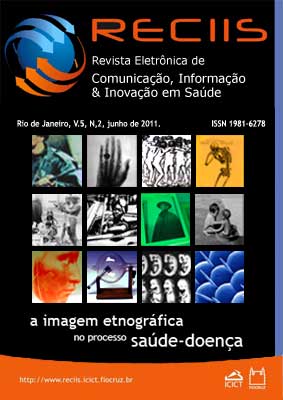Discourse analysis, the use of images and the health field: theoretical-methodological aspects
DOI:
https://doi.org/10.3395/reciis.v5i2.777Keywords:
discourse analysis, Interactional Sociolinguistics, qualitative research, images, HealthAbstract
This article aims at presenting the foundations of the Interactional Sociolinguistics perspective to discourse analysis and its use in health research, specifically Mental Health. Firstly, the term discourse analysis is discussed since it is an empirical methodological tool widely used in Human and Health Sciences. Secondly, the shared epistemological foundations that guide more than the 50 current approaches to discourse analysis are presented followed by explanations about the theoretical principles upon which the Interactional Sociolinguistics perspective is based, which conceives discourse as a co-joint production between participants of a face to face interaction. Then the methodological procedures used for data collection as well as for the corpus exam are presented such as creating a transcription system and establishing categories for actions/sequences. Next, it highlights the advantages and the problems of using images in health qualitative research. Finally, it discusses the ethical and practical implications for the use of images on health qualitative research that results from subscribing to the Interactional Sociolinguistics perspective to discourse analysis.Downloads
How to Cite
Issue
Section
License
Author’s rights: The author retains unrestricted rights over his work.
Rights to reuse: Reciis adopts the Creative Commons License, CC BY-NC non-commercial attribution according to the Policy on Open Access to Knowledge by Oswaldo Cruz Foundation. With this license, access, download, copy, print, share, reuse, and distribution of articles is allowed, provided that it is for non-commercial use and with source citation, granting proper authorship credits and reference to Reciis. In such cases, no permission is required from the authors or editors.
Rights of authors’s deposit / self-archiving: The authors are encouraged to deposit the published version, along with the link of their article in Reciis, in institutional repositories.












